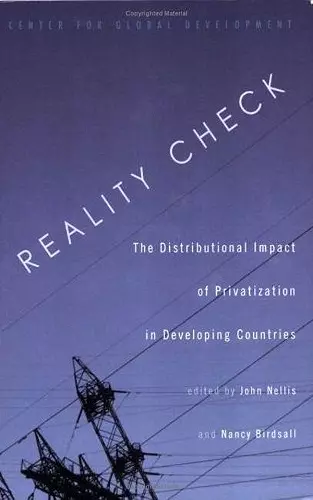Reality Check
The Distributional Impact of Privatization in Developing Countries
John Nellis editor N Birdsall editor
Format:Paperback
Publisher:Center for Global Development
Published:30th Oct '05
Currently unavailable, and unfortunately no date known when it will be back

"This book fills an important gap in the privatization literature by documenting its distributional consequences in developing and emerging-market nations. It provides an answer to a key question that has long haunted policymakers and privatization researchers: Why has privatization become so unpopular in developing and emerging economies, when the research clearly shows that privatization 'works' economically?" --Bill Megginson, Professor and Rainbolt Chair in Finance, University of Oklahoma "Privatization continues to be a contentious issue throughout Latin America, and indeed, the world. This volume of careful studies moves the debate from polemic to analysis. It shows that in Latin America at least, privatization has not been a major contributor to the increased inequality seen in the last decade." --Nora Lustig, President, Universidad de las Americas "Most studies of privatization look at what happens to companies; this volume looks at what happens to people--workers, consumers, and the disadvantaged--and measures whether they were better or worse off after the transaction. This is progress." --Joseph Stiglitz, Professor, Columbia University
Throughout the 1990's, privatization of inefficient state-owned enterprises was strongly embraced in developing and transitional economies. Little attention has gone to the distributional implications of the privatization movement, a particularly surprising oversight given the current backlash in many settings against further privatization.Throughout the 1990's, privatization of inefficient state-owned enterprises was strongly embraced in developing and transitional economies. Little attention has gone to the distributional implications of the privatization movement, a particularly surprising oversight given the current backlash in many settings against further privatization. This book offers a comprehensive set of country-specific studies on the effects of privatization on people —winners and losers in different income, employment, and education groups. The studies analyze the changes in public tax revenue from privatized enterprises, shifts in pension and other liabilities, and changes in income of different groups.
Contributors include David McKenzie (Stanford University), Dilip Mookherjee (Boston University), Gover Barja (Universidad Católica Boliviana, La Paz), Miguel Urquiola (Columbia University), Samuel Freije (Universidad de Las Américas in Puebla, Mexico), Luis A. Rivas (Ministry of Finance and Central Bank of Nicaragua), Máximo Torero, Enrique Schroth, and Alberto Pasco Font (Group of Analysis for Development [GRADE], Lima), Roberto Macedo (University of São Paulo, Presbyterian Mackenzie University, and Foundation Institute of Economic Research, São Paolo), Antonio Estache (World Bank), Michael Bleyzer and Edi Segura (SigmaBleyzer Corporation), Gary H. Jefferson, (Brandeis University), Su Jian (Brandeis and Peking Universities), Jiang Yuan and Yu Xinhua (National Bureau of Statistics, Beijing), and Malathy Knight-John and P.P.A. Wasantha (Institute of Policy Studies, Sri Lanka).
"Privatization was one of the key elements that helped to jump-start economic revival in Latin America in the 1990s. But politically, it has always been a difficult sell: Critics claim it rewards the wealthy and the foreign at the expense of the poor and the local. The studies in this book show that this is not the case; privatization's bad reputation is largely undeserved." —Pedro-Pablo Kuczynski, Minister of Economy and Finance of Peru
|"This book fills an important gap in the privatization literature by documenting its distributional consequences in developing and emerging-market nations. It provides an answer to a key question that has long haunted policymakers and privatization researchers: Why has privatization become so unpopular in developing and emerging economies, when the research clearly shows that privatization 'works' economically?" —Bill Megginson, Professor and Rainbolt Chair in Finance, University of Oklahoma
|"Privatization continues to be a contentious issue throughout Latin America, and indeed, the world. This volume of careful studies moves the debate from polemic to analysis. It shows that in Latin America at least, privatization has not been a major contributor to the increased inequality seen in the last decade." —Nora Lustig, President, Universidad de las Américas
|"Most studies of privatization look at what happens to companies; this volume looks at what happens to people--workers, consumers, and the disadvantaged--and measures whether they were better or worse off after the transaction. This is progress." —Joseph Stiglitz, Professor, Columbia University
ISBN: 9781933286006
Dimensions: unknown
Weight: unknown
300 pages